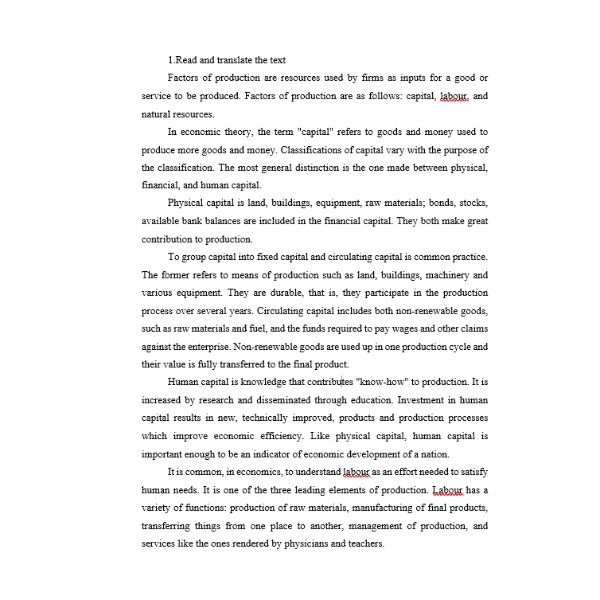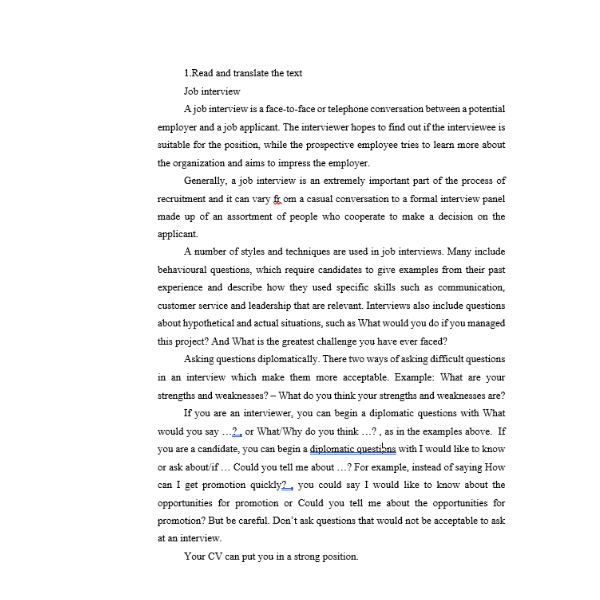Module 3 factors of motivation
200 pуб.
Купить
В наличии: 0
шт.
Module 3 factors of motivation
1.Read and translate the text
Herzber’s Motivation-Hygiene Theory
Professor Frederick Herzberg was a clinical psychologist and later Professor of Management at the University of Utah. There have been little serious challenge to his ideas since they were published in 1959, and this theory is still useful for managers who want to motivate their employees.
Herzberg carried out a motivation study on 200 accountants and engineers who worked in companies in the USA. These subjects of the study were asked two questions:
1. When did you feel particularly good about your job?
2. When did you feel exceptionally bad about your job?
The responses that Herzberg obtained were interesting and fairly consistent. Reported good feelings were usually associated with job experiences and job content. One example of these was the head of an accounting department; he was given the job of installing new computer equipment. He took pride in his work and was pleased to know that the new equipment mad a big difference in how his department functioned. Reported bad feelings, on the other hand, were usually associated with the surrounding or peripheral aspects of the job – the job context. An example of these feelings was given by an engineer; his first job was routine record keeping and managing the office when the boss was gone. His boss was always too busy to train him and became annoyed when he tried to ask questions. The engineer said that he was frustrated in his job context and that he felt that he was just an unimportant assistant in dead-end job.
Herzberg concluded that job satisfiers are related to job content and that job dissatisfiers are related to job context. Herzberg labeled the satiesfiers “motivators”, and he called the dissatiesfiers “hygiene factors”. The term ‘hygiene’ refers (as it does in the health field) to factors that are preventative; in Herzberg’s theory the hygiene factors are those that prevent dissatisfaction. Together, the motivators and the hygiene factors have become known as Herzberg’s two-factor theory of motivation.
Herzberg’s two-factor theory provided a new view of work motivation. Until his theory became known, most managers had focused on the hygiene factors. When faced with a motivation problem, the typical solution was higher pay, more fringe benefits, and better working conditions. However, the simplistic solution did not really work.
Management are often puzzled because they are paying high wages and salaries, have an excellent fringe-benefit package, and provide excellent working conditions, but their employees are still not motivated. Herzberg’s theory offered an explanation for his problem. By concentrating only on the hygiene factors, management were not only really motivating their personnel.
2.Read the text and match the answers below with the questions.
1. What did Herzberg ask the accountants and employees about?
2. What did he call the things that caused satisfaction?
3. What did he call the things that prevented dissatisfaction?
a) Hygiene factors
b) Motivators
c) Specific moments when they felt satisfied or dissatisfied about their job
3.Read the statements below and check again with the text to decide whether they are true or false.
1. The subjects of Herzberg’s study who felt good about their work talked about what they did in their job.
2. Those people who were unhappy about their work focused on the job content.
3. Hygiene factors help to avoid dissatisfaction.
4. Managers need to focus on job content as well as job context to motivate their staff.
4.The following lists show the top six factors that can cause satisfaction and dissatisfaction.
HYGIENE MOTIVATION
Company policy Achievement
Supervision Recognition
Relationship with the boss Work itself
Work conditions Responsibility
Salary Advancement
Relationship with peers Growth
Decide which of the above factors the following examples belong to. Then decide if they are hygiene factors or motivation factors.
1 a lot of bureaucracy (company policy – hygiene)
2 rude colleagues
3 praise
4 promotion
5 low pay
6 a job you enjoy
7 the chance to learn new skills
8 only a few days of annual leave
9 not enough support in the job
10 an aggressive manger
11 getting good result
12 he chance to manage a team
5.Complete the letter with these quantifiers.
Little few many a great deal of some enough
Dear Mr Sanchez,
I am writing on behalf of the employees. 1 _____ of them feel that the new pay deal is not 2 ___, as it does not cover the rise in the cost of living.
I am aware that you and the management have invested 3 ___ time and effort in securing this pay deal. However, 4 ___ union members believe that the outcome of the recent pay negotiations has had 5 ___ effect on improving the economic position of our factory workers.
We suggest that we hold a meeting of management amd the union representatives in the next 6___ days to resolve this matter.
Your sincerely,
Rosa Gutierrez
6. Read the quote expressed by Henry Ford and answer one of the following questions.
“There is joy in work. There is no happiness except in the realization that we have accomplished something”, - Henry Ford.
1. Is work always enjoyable? Should employees expect to be bored sometimes?
2. Do you feel happy when you can see the results of your work?
3. Make up a description of the ideal manager: personal qualities he/she should possess, knowledge he/she should acquire etc.
1.Read and translate the text
Herzber’s Motivation-Hygiene Theory
Professor Frederick Herzberg was a clinical psychologist and later Professor of Management at the University of Utah. There have been little serious challenge to his ideas since they were published in 1959, and this theory is still useful for managers who want to motivate their employees.
Herzberg carried out a motivation study on 200 accountants and engineers who worked in companies in the USA. These subjects of the study were asked two questions:
1. When did you feel particularly good about your job?
2. When did you feel exceptionally bad about your job?
The responses that Herzberg obtained were interesting and fairly consistent. Reported good feelings were usually associated with job experiences and job content. One example of these was the head of an accounting department; he was given the job of installing new computer equipment. He took pride in his work and was pleased to know that the new equipment mad a big difference in how his department functioned. Reported bad feelings, on the other hand, were usually associated with the surrounding or peripheral aspects of the job – the job context. An example of these feelings was given by an engineer; his first job was routine record keeping and managing the office when the boss was gone. His boss was always too busy to train him and became annoyed when he tried to ask questions. The engineer said that he was frustrated in his job context and that he felt that he was just an unimportant assistant in dead-end job.
Herzberg concluded that job satisfiers are related to job content and that job dissatisfiers are related to job context. Herzberg labeled the satiesfiers “motivators”, and he called the dissatiesfiers “hygiene factors”. The term ‘hygiene’ refers (as it does in the health field) to factors that are preventative; in Herzberg’s theory the hygiene factors are those that prevent dissatisfaction. Together, the motivators and the hygiene factors have become known as Herzberg’s two-factor theory of motivation.
Herzberg’s two-factor theory provided a new view of work motivation. Until his theory became known, most managers had focused on the hygiene factors. When faced with a motivation problem, the typical solution was higher pay, more fringe benefits, and better working conditions. However, the simplistic solution did not really work.
Management are often puzzled because they are paying high wages and salaries, have an excellent fringe-benefit package, and provide excellent working conditions, but their employees are still not motivated. Herzberg’s theory offered an explanation for his problem. By concentrating only on the hygiene factors, management were not only really motivating their personnel.
2.Read the text and match the answers below with the questions.
1. What did Herzberg ask the accountants and employees about?
2. What did he call the things that caused satisfaction?
3. What did he call the things that prevented dissatisfaction?
a) Hygiene factors
b) Motivators
c) Specific moments when they felt satisfied or dissatisfied about their job
3.Read the statements below and check again with the text to decide whether they are true or false.
1. The subjects of Herzberg’s study who felt good about their work talked about what they did in their job.
2. Those people who were unhappy about their work focused on the job content.
3. Hygiene factors help to avoid dissatisfaction.
4. Managers need to focus on job content as well as job context to motivate their staff.
4.The following lists show the top six factors that can cause satisfaction and dissatisfaction.
HYGIENE MOTIVATION
Company policy Achievement
Supervision Recognition
Relationship with the boss Work itself
Work conditions Responsibility
Salary Advancement
Relationship with peers Growth
Decide which of the above factors the following examples belong to. Then decide if they are hygiene factors or motivation factors.
1 a lot of bureaucracy (company policy – hygiene)
2 rude colleagues
3 praise
4 promotion
5 low pay
6 a job you enjoy
7 the chance to learn new skills
8 only a few days of annual leave
9 not enough support in the job
10 an aggressive manger
11 getting good result
12 he chance to manage a team
5.Complete the letter with these quantifiers.
Little few many a great deal of some enough
Dear Mr Sanchez,
I am writing on behalf of the employees. 1 _____ of them feel that the new pay deal is not 2 ___, as it does not cover the rise in the cost of living.
I am aware that you and the management have invested 3 ___ time and effort in securing this pay deal. However, 4 ___ union members believe that the outcome of the recent pay negotiations has had 5 ___ effect on improving the economic position of our factory workers.
We suggest that we hold a meeting of management amd the union representatives in the next 6___ days to resolve this matter.
Your sincerely,
Rosa Gutierrez
6. Read the quote expressed by Henry Ford and answer one of the following questions.
“There is joy in work. There is no happiness except in the realization that we have accomplished something”, - Henry Ford.
1. Is work always enjoyable? Should employees expect to be bored sometimes?
2. Do you feel happy when you can see the results of your work?
3. Make up a description of the ideal manager: personal qualities he/she should possess, knowledge he/she should acquire etc.




